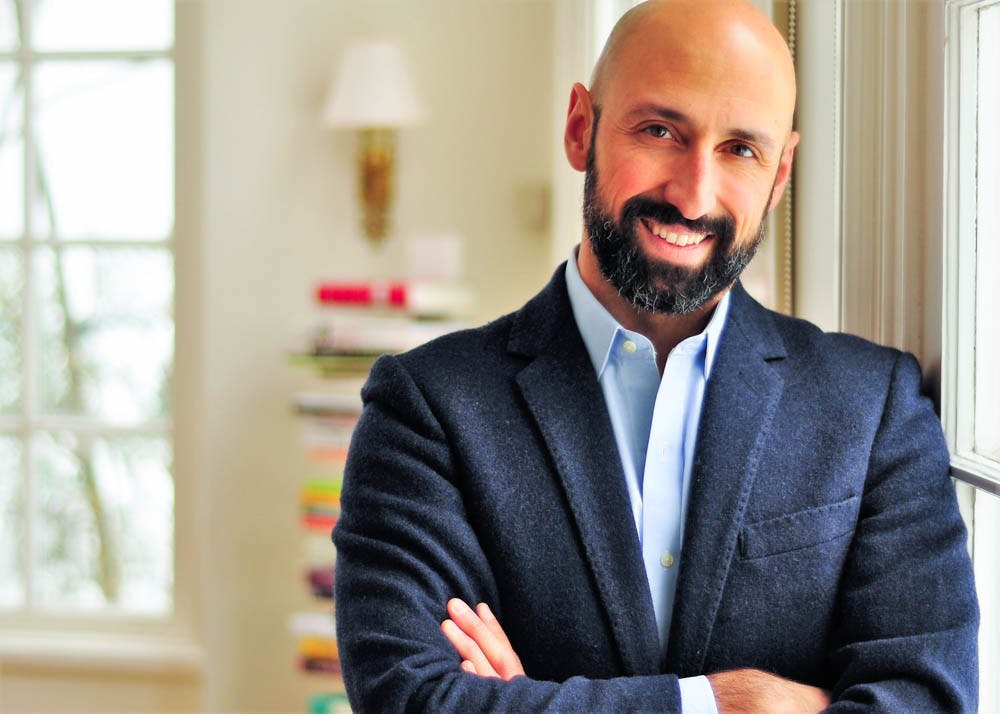Assistant Professor of Comparative Literature Elias Muhanna leans back in his office chair, sporting a purple-checkered button-down shirt and sipping from a pink water bottle. With a full black beard and cleanly shaven head, the young professor breathes a sort of millennial hipness increasingly unusual in the field of comparative literature.
Muhanna’s presence as a cool intellectual reflects his unusual ability to connect academic scholarship to a general audience. A contributor to the New Yorker and writer of the acclaimed blog “Qifa Nabki,” Muhanna has become a highly respected and influential public scholar.
Muhanna’s national following helped him become the University’s first recipient of the Whiting Public Engagement Fellowship, a selective $50,000 award given to humanities faculty members pursuing scholarly projects the public can engage with.
“This is a unique fellowship that recognized public-facing work by scholars,” Muhanna said. “While there are many fellowships out there that support academic scholarship, I think it’s quite rare to find a program that is focused on cultivating work that has a mainstream audience in mind.”
Muhanna’s winning proposal — a book project to be titled “The Language of Paradise: Arabic’s Past, Present, and Future” — studies differences between written and spoken Arabic as a way of understanding lived experiences in the Middle East.
“I really think that his book will bring the best of the humanities to the public,” said Daniel Reid, executive director of the Whiting Foundation.“It will affect the conversation about how we think about the Middle East.”
The Whiting Public Engagement Fellowship, though only in its second year, has typically made a point to feature work less dependent on text, such as podcasts. Given this trend, a book proposal was a hard sell for the seven anonymous fellowship judges, Reid said.
“It’s hard to be able to write both for scholars and for the public,” Reid said. “But Professor Muhanna’s application just hit it out of the park.”
Muhanna’s persuasive plan for his book, history of successful public outreach and celebrated long-form publications contributed to his knockout application, Reid said. Muhanna edited and translated Shihab al-Din al-Nuwayri’s 14th-century Arabic encyclopedia in his book “The Ultimate Ambition in the Arts of Erudition,” which National Public Radio recognized as one of the best books of 2016. His monograph, an in-depth paper on a specialized topic, is titled “The World in a Book: Al-Nuwayri and the Islamic Encylopedic Tradition” and is expected to be released November 2017.
Muhanna’s success is not limited to his writing; he has become one of the comparative literature department’s most popular professors, said Marc Redfield, chair of the comparative literature department and professor of comparative literature and English. “Students unanimously praise Professor Muhanna’s ability to make the material come alive,” Redfield said. “He is one of the most talented and successful and inspiring young faculty members that I have had the pleasure of working with.”
But students will have to bear spring 2018 without Muhanna’s inspiration, as he will be taking the semester off to focus on his book project. During that semester, he hopes to travel to North Africa and Qatar and do archival work to reconstruct the material history of the Arabic language, he said. At the same time, Muhanna expects to continue publishing digital pieces that help develop his project-related narrative.
Muhanna has already begun work for his book project, leaving for Jordan last Thursday to accompany a friend on an archaeological expedition.
But even with the exciting nature of his work, Muhanna expects to be ready to return to teaching fall 2019.
“Writing a book is actually very boring in many cases,” Muhanna said. “It’s the daily death by word processor.”
When asked about Muhanna’s future at the University, Redfield said, “I foresee nothing but good things for Professor Elias Muhanna at Brown.”





